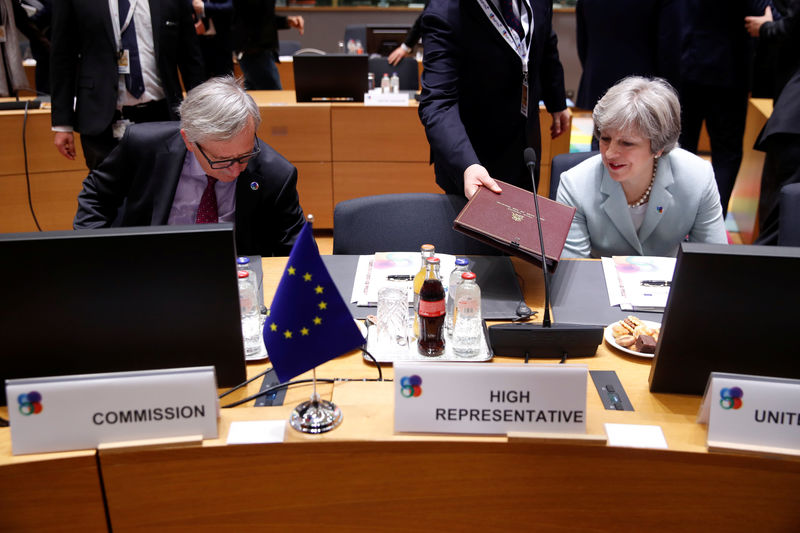 © Reuters. Britain’s Prime Minister Theresa May and EU Commission President Juncker attend a summit at the European Council Headquarters in Brussels
© Reuters. Britain’s Prime Minister Theresa May and EU Commission President Juncker attend a summit at the European Council Headquarters in BrusselsBy Alastair Macdonald and Jan Strupczewski
BRUSSELS (Reuters) – British Prime Minister Theresa May repeated her wish on Friday to make a joint move with the European Union to open negotiations on a post-Brexit trade deal.
Speaking to reporters on arrival at a Brussels summit with ex-Soviet states, she said she would talk to EU summit chair Donald Tusk later in the day about “positive negotiations we’re having, looking ahead to the future deep and special partnership that I want with the European Union”.
“What I’m clear about is that we must step forward together,” she added. “This is for both the UK and for the European Union to move on to the next stage.”
The EU wants May to improve her financial and other offers before opening trade talks. May has said she wants guarantees of trade talks before making a new offer.
May will discuss Brexit plans with European Council President Tusk at 4:30 p.m. (1530 GMT) on Friday, the EU summit chair’s office said, confirming the time of talks.
EU officials are waiting for signs from May that she is ready to strike a deal on finances and other issues to conclude a first phase of talks next month on Britain’s withdrawal in order to secure EU agreement to negotiate a future trade pact.
IRISH BORDER
EU negotiators are not expecting a major move from May as early as Friday. She has said she wants a guarantee of opening trade talks if she increases Britain’s financial offer. EU officials say they are working on a “joint report” that will confirm in public the results of the first stage of bargaining.
May will meet Tusk, the former Polish prime minister, after he has chaired an EU summit in Brussels at which six former Soviet neighbors including Ukraine are discussing their partnership with the European Union. May said that Britain would remain committed to European security after it leaves the EU.
Aside from how much Britain will pay the Union on leaving in March 2019 to cover outstanding commitments, EU leaders also want to see better terms from London for the rights of EU citizens living in Britain after Brexit and more detail on how it will avoid a disruptive “hard border” in Northern Ireland.
A domestic government crisis in Dublin has raised further questions about how Ireland will be able to sign off on any deal. Irish Foreign Minister Simon Coveney, representing Prime Minister Leo Varadkar at the summit, told reporters that the threat by Fianna Fail to bring down the minority government over calls for the deputy premier to resign were irresponsible.
Ireland did not need a new election now, Coveney said.
He stressed that Ireland would not approve a move to trade talks if there were not “sufficient progress” toward a clear plan from Britain on how to avoid a hard border.
European Commission President Jean-Claude Juncker said he thought talks were making progress and he would see after his own meeting in Brussels with May on Dec. 4 whether there was sufficient progress to recommend that leaders who meet again at a summit on Dec. 14-15 should launch future trade talks.
Fusion Media or anyone involved with Fusion Media will not accept any liability for loss or damage as a result of reliance on the information including data, quotes, charts and buy/sell signals contained within this website. Please be fully informed regarding the risks and costs associated with trading the financial markets, it is one of the riskiest investment forms possible.
Source: Investing.com


























